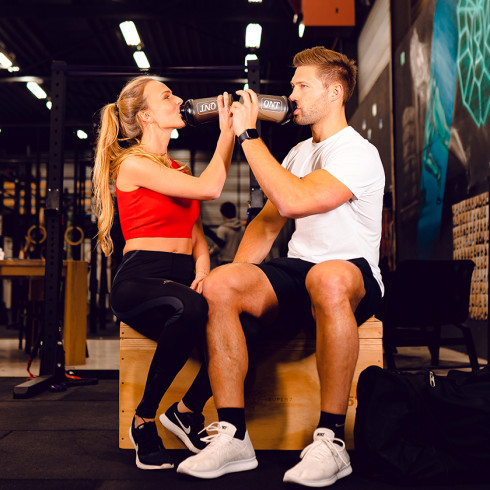The best protein for women: building muscle while eating !
Why Proteins Are Essential for Muscle Building in Women.
Proteins play a fundamental role in muscle building for several reasons. As a key macronutrient, they are crucial for the construction and repair of muscle tissues. Here’s why they are essential for women looking to increase their muscle mass:
1. Role of proteins in muscle synthesis.
Proteins are made up of amino acids, which form the building blocks of muscles. During resistance or weight training, muscle fibers undergo micro-tears. To repair and strengthen these fibers, the body uses amino acids from proteins. This process, known as protein synthesis, is crucial for increasing muscle mass and strength.
2.Recovery and muscle repair.
After an intense workout, the body needs to recover. Proteins help speed up this recovery by reducing muscle damage and promoting tissue repair. Adequate protein intake post-exercise can reduce soreness and improve performance in subsequent workouts.
3. Maintaining lean muscle mass.
For women, maintaining lean muscle mass is particularly important not only for aesthetic reasons but also for overall health. Adequate muscle mass contributes to a faster metabolism, aids in weight management, and improves bone density, which is crucial for preventing osteoporosis.
4. Hormonal regulation.
Proteins also play a role in hormonal regulation, which is vital for muscle growth. Proper levels of certain hormones, such as insulin and growth hormones, facilitate the absorption of amino acids and stimulate protein synthesis.
5. Sustained energy supply.
Unlike carbohydrates, which provide quick but temporary energy, proteins offer a more sustained energy source. This helps maintain energy levels during workouts and prevents energy dips, allowing for the maximization of resistance training effectiveness.
6. Impact on body composition.
Adequate protein intake helps improve body composition by increasing muscle mass and reducing fat mass. This is particularly beneficial for women looking to refine their figure while gaining strength and endurance.
7. Protein sources suited for women.
Choosing the right protein sources is crucial for optimizing muscle gain. High-quality proteins, such as those from whey, chicken, fish, eggs, and legumes, provide all the essential amino acids needed for muscle growth. Protein supplements can also be a convenient option to meet daily protein needs.
Proteins are an essential element for any woman looking to build muscle. They support muscle growth, recovery, hormonal regulation, and contribute to improved body composition. It is crucial to include an adequate amount of protein in your daily diet to maximize the results of your strength training efforts.
Protein Needs for Women Based on Their Fitness Goals.
Protein needs vary significantly from person to person, depending on factors such as age, weight, activity level, and especially fitness goals. For women, it is essential to understand how much protein they need to consume to achieve their specific goals, whether it is muscle gain, fat loss, or overall health maintenance.
1. Muscle gain.
For women looking to increase their muscle mass, a high protein intake is crucial. General recommendations for muscle gain suggest consuming between 1.6 and 2.2 grams of protein per kilogram of body weight per day. For example, a woman weighing 60 kg should aim for between 96 and 132 grams of protein per day. This intake helps maximize muscle protein synthesis, aiding in the repair and building of new muscle tissue after workouts.
2. Fat loss.
During fat loss, it is important to preserve as much muscle mass as possible. To achieve this, a slightly higher protein intake than usual can be beneficial. Experts often recommend between 1.8 and 2.7 grams of protein per kilogram of body weight per day. This helps maintain muscle mass while creating the necessary caloric deficit for weight loss. Proteins also have a higher thermic effect compared to fats and carbohydrates, meaning they can help boost metabolism.
3. Maintenance and overall health.
For women who simply want to maintain their current weight and body composition while staying healthy, protein needs may be slightly lower. Generally, an intake of 1.2 to 1.6 grams of protein per kilogram of body weight per day is sufficient. This intake helps maintain muscle mass, support the immune system, and contribute to various essential biological processes.
4. Endurance athletes and sportswomen.
Women who participate in endurance sports, such as running, cycling, or swimming, also have specific protein needs. Although carbohydrates are often emphasized for these athletes, proteins play a crucial role in muscle repair and recovery. An intake of 1.4 to 2.0 grams per kilogram of body weight per day is recommended to support recovery and prevent muscle loss due to intensive and frequent training.
5. Older women and specific needs.
As we age, protein needs may increase to compensate for the natural loss of muscle mass and decreased efficiency of protein synthesis. Older women may benefit from an intake of 1.2 to 2.0 grams of protein per kilogram of body weight per day, depending on their activity level and overall health. Adequate protein intake can help prevent sarcopenia (age-related muscle loss) and maintain mobility and strength.
6. Tips for meeting your protein needs.
Meeting daily protein needs can seem challenging, but there are many strategies to achieve it :
- Balanced meals: Include a protein source at every meal, such as eggs for breakfast, chicken or fish for lunch and dinner.
- Protein snacks: Choose protein-rich snacks like Greek yogurt, nuts, or protein bars.
- Supplements: Use protein powders, such as whey or plant-based protein, to meet daily protein needs.
- Meal preparation: Plan and prepare meals in advance to ensure sufficient protein intake in each meal.
Protein needs for women vary depending on their fitness goals, ranging from muscle gain to fat loss or maintaining health. Tailoring protein intake to these goals is crucial for maximizing results and supporting performance and recovery.
Ideal Protein Sources for Women.
To maximize the benefits of proteins, it is important to choose high-quality sources that provide all the essential amino acids needed for muscle growth and repair. Here is an overview of the best protein sources for women, covering both animal and plant-based options.
1. Animal proteins.
Animal proteins are considered complete because they contain all essential amino acids. Here are some of the best sources :
- Chicken: Rich in protein and low in fat, chicken is an excellent protein source for women. A 100-gram serving of chicken breast provides about 31 grams of protein.
- Fish: Fish, such as salmon, tuna, and trout, is not only rich in protein but also in omega-3 fatty acids, which are beneficial for cardiovascular health. A 100-gram serving of salmon provides about 25 grams of protein.
- Eggs: Eggs are a versatile and economical protein source. A large egg contains about 6 grams of protein and is also rich in essential vitamins and minerals.
- Turkey: Similar to chicken, turkey is an excellent source of lean protein. A 100-gram serving of turkey breast provides about 29 grams of protein.
- Lean beef: For women who consume red meat, lean beef is a good source of protein and iron. A 100-gram serving of lean beef provides about 26 grams of protein.
2. Plant-based proteins.
Plant-based proteins are essential for women following a vegetarian or vegan diet. Here are some of the best sources :
- Lentils: Lentils are rich in protein and fiber, making them a staple in many vegetarian diets. One cup of cooked lentils provides about 18 grams of protein.
- Quinoa: Quinoa is a complete protein, containing all essential amino acids. One cup of cooked quinoa provides about 8 grams of protein.
- Tofu and tempeh: These soy-based products are excellent protein sources for vegetarians and vegans. A 100-gram serving of tofu provides about 8 grams of protein, while tempeh provides about 19 grams.
- Chickpeas: Chickpeas are another rich source of plant-based protein and fiber. One cup of cooked chickpeas provides about 15 grams of protein.
- Seeds and nuts: Chia seeds, flaxseeds, almonds, and cashews are concentrated sources of protein and healthy fats. A 30-gram serving of almonds provides about 6 grams of protein.
3. Protein supplements.
For women with high protein needs or an active lifestyle, protein supplements can be a convenient solution :
- Whey protein: Whey is a fast-digesting milk protein, ideal for post-workout recovery. A typical serving of whey powder provides about 20-25 grams of protein.
- Casein: Casein is another milk protein, but it digests slowly, making it a good option before bedtime to nourish muscles overnight. A serving provides about 20-25 grams of protein.
- Pea protein: For those seeking a vegan alternative, pea protein is an excellent option. A serving of pea protein powder provides about 20 grams of protein.
- Rice protein: Rice protein is hypoallergenic and a good option for people with food allergies. A serving provides about 15-20 grams of protein.
4. Combining different sources.
To maximize protein intake and benefit from a complete amino acid profile, it is recommended to combine different protein sources throughout the day. For example, pairing animal and plant-based proteins or combining legumes with cereals can enhance the quality of the proteins consumed.
It can be stated that women have a wide range of protein sources available to them, from animal to plant-based options and supplements. By choosing varied and high-quality sources, they can meet their protein needs, support their fitness goals, and maintain optimal health.
Common Mistakes to Avoid with Protein Supplements.
Protein supplements can be a valuable tool for reaching fitness goals, but it's essential to use them correctly to avoid common pitfalls. Here is an overview of frequently made mistakes and tips to avoid them :
1. Consuming too much protein.
Many people believe that more protein means more muscle. However, consuming excessive amounts of protein does not necessarily lead to better muscle growth and can even be counterproductive. Excess protein can be stored as fat or cause digestive issues. It is important to adhere to recommendations based on body weight and goals.
2. Ignoring balanced macronutrient needs.
Proteins are essential, but they should not be consumed at the expense of other important macronutrients like carbohydrates and fats. A balanced diet including appropriate amounts of all macronutrients is crucial for optimal performance and adequate recovery. Carbohydrates provide the energy needed for workouts, while fats are essential for hormonal health and cellular function.
3. Not reading labels.
Not all protein supplements are created equal. Some contain additives, artificial sweeteners, or unnecessary fillers that can be harmful or simply unnecessary. It is crucial to read labels to understand exactly what you are consuming. Look for products with simple ingredients and transparent nutritional profiles as a good practice.
4. Neglecting the timing of consumption.
The timing of protein consumption can influence recovery and muscle growth. Many people overlook the importance of consuming protein after exercise. Consuming protein within 30 to 60 minutes post-workout can maximize protein synthesis and promote better recovery. Additionally, spreading protein intake throughout the day is more effective than consuming a large amount at once.
5. Using supplements as meal replacements.
Protein supplements should not regularly replace complete meals. They are designed to complement the diet, not to replace whole food sources that provide essential vitamins, minerals, and other nutrients. Whole food meals are crucial for balanced nutrition.
6. Ignoring individual needs.
Protein needs vary based on age, gender, weight, activity level, and individual goals. What works for one person may not be suitable for another. It is important to tailor protein intake and supplement use according to personal needs and consult a healthcare professional or nutritionist if necessary.
7. Not staying hydrated enough.
Protein, especially when consumed in supplement form, can increase the body's need for water. Not drinking enough water can lead to dehydration and potential kidney issues. It's important to stay adequately hydrated by drinking water throughout the day, particularly after consuming protein.
8. Relying solely on supplements.
While protein supplements are convenient, they should not be relied upon exclusively. A varied diet rich in natural protein sources such as meat, fish, eggs, legumes, and dairy products is essential for optimal health. Supplements should be used as an addition to a balanced diet, not as a standalone solution.
9. Forgetting to vary protein sources.
Relying on the same type of protein can limit your intake of various amino acids and other nutrients. Varying protein sources, including both animal and plant-based proteins, can provide a more complete nutritional profile and prevent monotony in your diet.
Protein supplements can be extremely beneficial when used correctly. Avoiding these common mistakes helps to maximize their benefits while maintaining a balanced diet and a healthy approach to sports nutrition.
Differences Between Protein Needs for Men and Women.
Protein needs vary not only based on fitness goals and activity level but also by sex. While protein is essential for muscle building and repair in all individuals, there are key differences between men and women in terms of their needs and how their bodies use these nutrients. Here is an overview of the main distinctions.
1. Physiological and hormonal differences.
Men and women have significant biological and hormonal differences that influence their protein needs :
- Muscle mass: Generally, men have a higher muscle mass than women, which can increase their protein needs. Muscle mass requires more protein for maintenance and growth.
- Testosterone: Higher levels of testosterone in men promote a greater capacity to develop and maintain muscle mass, which may require a higher protein intake.
- Estrogen and progesterone: In women, hormonal fluctuations throughout the menstrual cycle can affect protein synthesis and nutritional needs.
2. Specific nutritional recommendations.
Protein consumption recommendations vary by sex, primarily due to differences in body composition and activity levels :
- Recommended daily intake: For men, the recommended daily protein intake is generally higher than for women due to their greater body mass. For example, an active man might need 1.6 to 2.2 grams of protein per kilogram of body weight, while an active woman might need 1.2 to 1.6 grams per kilogram.
- Specific goals: Women may have different protein needs based on their goals, such as muscle gain, weight loss, or postpartum recovery. Men, on the other hand, often aim for higher intakes to support intense training and muscle growth.
3. Metabolism and protein utilization.
Protein metabolism and utilization can also differ between men and women :
- Protein synthesis: Men tend to have faster protein synthesis due to their greater muscle mass and higher levels of testosterone.
- Protein breakdown: Women may have lower protein breakdown rates, meaning they might require slightly lower intakes to maintain protein balance.
4. Preferred protein sources.
Food preferences and tolerances can also vary between men and women :
- Animal vs. plant proteins: Men may tend to consume more animal proteins, while women might prefer plant-based sources due to health or ethical concerns.
- Protein supplements: Women might choose specific supplements like pea or soy protein, while men may favor whey or casein for their complete amino acid profile and rapid absorption.
5. Specific considerations for women.
Some situations specific to women require special attention regarding protein :
- Pregnancy and breastfeeding: Protein needs increase significantly during pregnancy and breastfeeding to support the growth and development of the baby.
- Menopause: Hormonal changes during menopause can affect muscle mass and body composition, potentially requiring an adjustment in protein intake to maintain lean mass.
Although proteins are essential for both men and women, their specific needs differ due to physiological, hormonal, and metabolic factors. It is important to consider these differences to optimize protein nutrition based on individual goals and life stages.
Coach's Tips.

- Training methods should not change for women or men: The principles remain the same: push to your limits, to failure! However, a female athlete may be well-respected in her sports community but may face criticism about her physique when she steps outside of it. It is important for a woman to decide whether to heed these critiques or to truly embrace her athletic physique.
- Regarding exercises and targeted areas, each woman should train her body according to her specific goals. Often, these goals differ from those of men.
- When it comes to nutrition, women generally have lower caloric needs. To ensure the body gets everything it needs, it is important to monitor iron levels with regular blood tests.
Related posts
-
 Summer holidays: How to limit the damage?
Posted in: Our tips24/06/2021On holiday, we often tend to let ourselves go. Unless you're a hardcore sportsman, you tend to abandon your trainers...Read more
Summer holidays: How to limit the damage?
Posted in: Our tips24/06/2021On holiday, we often tend to let ourselves go. Unless you're a hardcore sportsman, you tend to abandon your trainers...Read more -
 Which fat burner to choose?
Posted in: Our tips26/05/2021To lose weight and burn fat, there is no secret: you have to do sport and take care of your diet. However, it is...Read more
Which fat burner to choose?
Posted in: Our tips26/05/2021To lose weight and burn fat, there is no secret: you have to do sport and take care of your diet. However, it is...Read more -
 Summer body edition for men: How to prepare your body?
Posted in: Our tips11/05/2021Gentlemen ? The return of the sun and its warm rays are almost here! The degrees are slowly but surely rising, but...Read more
Summer body edition for men: How to prepare your body?
Posted in: Our tips11/05/2021Gentlemen ? The return of the sun and its warm rays are almost here! The degrees are slowly but surely rising, but...Read more -
 9 good reasons to do sport.
Posted in: Our tips22/04/2021Sometimes the urge to exercise is not always there. And although we always tell ourselves that this year will finally...Read more
9 good reasons to do sport.
Posted in: Our tips22/04/2021Sometimes the urge to exercise is not always there. And although we always tell ourselves that this year will finally...Read more -
 Discover how to take care of your faithful companion: your shaker!
Posted in: Our tips07/04/2021In your bag, in your hand, in your sink, it is everywhere! The shaker is an essential element of any good training....Read more
Discover how to take care of your faithful companion: your shaker!
Posted in: Our tips07/04/2021In your bag, in your hand, in your sink, it is everywhere! The shaker is an essential element of any good training....Read more
Blog categories
Popular posts
-
 Looking thinner but at a heavier weight? Is that possible?04/10/2021Posted in: Our tipsAdvertising has shaped our thinking! We have been forced for years to believe that losing weight is the key to having...Read more
Looking thinner but at a heavier weight? Is that possible?04/10/2021Posted in: Our tipsAdvertising has shaped our thinking! We have been forced for years to believe that losing weight is the key to having...Read more -
 Proteins for weight loss !29/12/2023Posted in: Our tipsDive into the fascinating world of proteins and their key role in weight loss. Discover how to choose the best...Read more
Proteins for weight loss !29/12/2023Posted in: Our tipsDive into the fascinating world of proteins and their key role in weight loss. Discover how to choose the best...Read more -
 Which foods boost testosterone levels ?07/05/2021Posted in: Food supplementsTestosterone, often associated with virility, has much more to offer than you might think. It plays a crucial role in...Read more
Which foods boost testosterone levels ?07/05/2021Posted in: Food supplementsTestosterone, often associated with virility, has much more to offer than you might think. It plays a crucial role in...Read more -
 10 BENEFITS OF GLUTAMINE.02/01/2024Posted in: Our tipsDiscover the power of L-glutamine, an underrated superhero in the world of amino acids! Essential for revitalizing...Read more
10 BENEFITS OF GLUTAMINE.02/01/2024Posted in: Our tipsDiscover the power of L-glutamine, an underrated superhero in the world of amino acids! Essential for revitalizing...Read more -
 Is there a link between sex and sport?14/11/2019Posted in: LifestyleMany have already asked questions about sex and sport. Most of the time, people want to be reassured by the many...Read more
Is there a link between sex and sport?14/11/2019Posted in: LifestyleMany have already asked questions about sex and sport. Most of the time, people want to be reassured by the many...Read more

.jpg)

